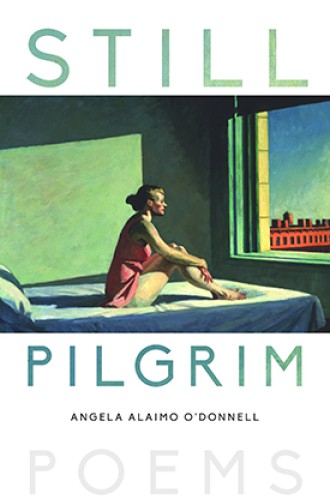Paradox at the heart of poetry
The Still Pilgrim—seemingly Angela Alaimo O'Donnell's alter ego—reflects joy and longing.
The poems in Angela Alaimo O’Donnell’s new collection embody an old and much neglected poetic virtue: they are companionable. They spring from a faith, which has been lost by many contemporary poets, in the human capacity to discern meaning in the shifting realities of our lives and to express that meaning (at least in a limited way) in language.
O’Donnell’s faith in poetry seems to be grounded in a deep Christian faith. She teaches English at Fordham and has published (among other prose works) a biography of Flannery O’Connor. This collection is O’Donnell’s seventh, and her poems—which have appeared with some regularity in the pages of the Century—locate themselves within the tradition of other Christian poets (think Gerard Manley Hopkins and T. S. Eliot, to mention two iconic examples) who accept the truth of the incarnation and see the world in its light.
Read our latest issue or browse back issues.
A lovely poem in the final section of the book captures an important aspect of the poet’s vision. In “The Still Pilgrim Celebrates Spring,” spring weather brings into focus the transience of the world’s beauty: “For now the heat is bearable. / For now the light is gold and fine.” Yes, for now. For now, the spring days are gorgeous, but of course they don’t last, as nothing beautiful can in the world we know. And yet the poem affirms a deeper truth, which the spring also teaches: “for nothing is so riven here / that love can’t straight and make it whole. / . . . All that leaves returns. It’s fact. / The light we thought we lost comes back.” Without dogmatic assertion, this poem finds in spring a hint of final redemption—in Christian terms, a hint of God’s promised new creation.
Paradox colors the world, especially when seen through the eyes of faith, and paradox is at the heart of these poems. Consider the collection’s title: Still Pilgrim. How can a pilgrim, who is a traveler by definition, be characterized as still? “This world was never made for rest,” says “The Still Pilgrim Ponders a Paradox,” the poem serving as the book’s epilogue. “And still you stay as still can be / unmoved by your velocity.”
In these poems, the Still Pilgrim—seemingly the poet’s alter ego—reflects on longing and the world’s impermanence, the fleetingness of time and vivid memories, piercing joy and piercing grief. March sunlight makes “bright diamonds in the brown waves” of the Hudson River and evokes the Still Pilgrim’s praise. The Still Pilgrim is seated beside her “grown young son” at the hospital, hoping “for blessing,” when a diagnosis of multiple sclerosis is delivered. Seeing the Vietnam Veterans Memorial creates in the Still Pilgrim such a sense of “unspeakable loss” that language fails and she can only “turn away” in silence.
Even the most intense joys in these poems—as in the real world—never fully break free from the shadow of defeat and sorrow. The reader gets the sense that the Still Pilgrim is making a one-step-forward, two-steps-back kind of progress, which brings to mind C. S. Lewis’s description of fallen human life before God in The Problem of Pain: “Thus . . . all the days of our life, we are sliding, slipping, falling away—as if God were . . . a smooth inclined plane on which there is no resting.”
This characteristic of human life, to which O’Donnell’s poems call attention, may supply the unspoken backdrop for one of the book’s most powerful poems, “The Still Pilgrim Tells a Fish Story.” It is, I think, a parable of grace that concerns a pursuing Moby Dick–like fish, from which there appears to be no escape. We are “at the mercy” of this fish, the poem ironically—and reassuringly—tells us. “Did you really believe there’d come a day / when you would be the one that got away?”
Companionability is a poetic virtue of special importance in our time and place, and it is abundantly present in O’Donnell’s poems. The Still Pilgrim says of her (by no means affluent) childhood home: “You’d never know we were among the least. / Bread was our mercy. Wine was our cure.” There is a generosity of spirit here, an unself-absorbed openness about the triumphs and vulnerabilities of our common experience of life. O’Donnell’s poems assume—even as they’re reaching toward it—a deep connection, a kind of communion with readers. How countercultural. How necessary here and now.
“We are living in an anti-art age. The world is now a brutal place and obsessed with speed and wealth.” So said singer and songwriter Paul Simon in a 2015 interview, and one could understandably fear, in such an age as ours, that poetry has finally become irrelevant. But I would like to think, and Angela O’Donnell’s engaging and deeply humane poems in Still Pilgrim encourage me in doing so, that poems will go on functioning as diverse mercies we can keep with us—at home or away—for the pleasure of their company and as a means of remembering who we are.






